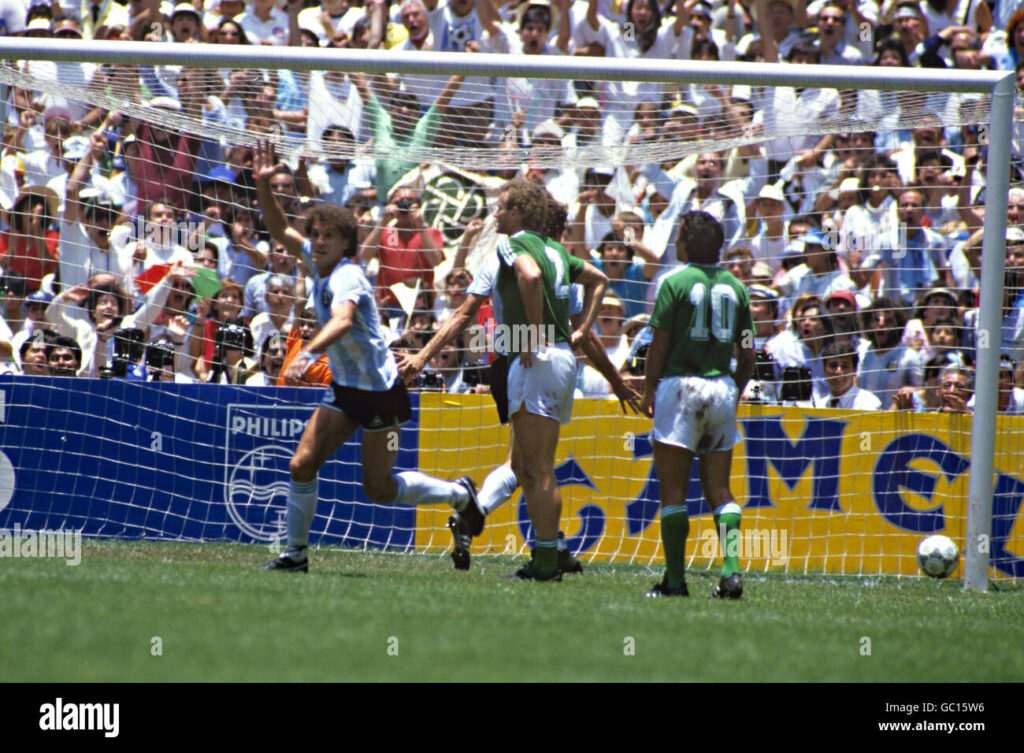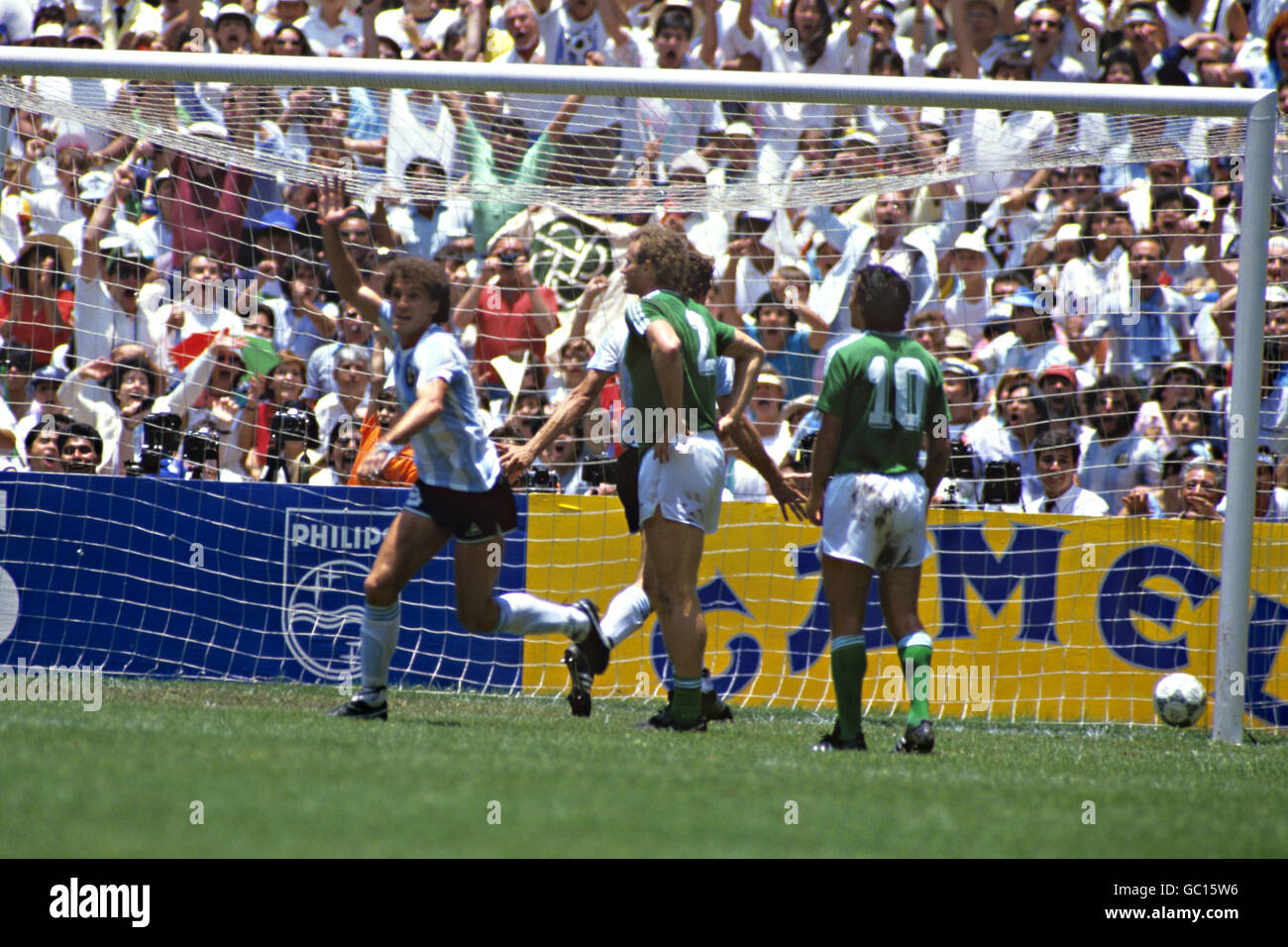
The 1986 World Cup Final: Maradona’s Triumph and Argentina’s Glory
The 1986 World Cup Final, held at the Estadio Azteca in Mexico City on June 29, 1986, remains one of the most iconic matches in football history. It pitted Argentina, led by the legendary Diego Maradona, against West Germany in a thrilling contest that captivated the world. The match wasn’t just a final; it was a culmination of skill, strategy, and sheer determination. The 1986 World Cup Final is still talked about today.
The Road to the Final
Argentina’s journey to the 1986 World Cup Final was largely defined by the brilliance of Maradona. He single-handedly carried the team through several crucial matches, showcasing his unparalleled dribbling skills, vision, and goal-scoring ability. Their group stage saw them defeat South Korea and Bulgaria, and draw with Italy. In the knockout stages, they overcame Uruguay in the Round of 16.
Their quarter-final match against England became infamous for Maradona’s ‘Hand of God’ goal and his stunning solo effort, often hailed as the ‘Goal of the Century.’ The semi-final saw Argentina defeat Belgium with Maradona scoring two more goals, securing their place in the 1986 World Cup Final.
West Germany, on the other hand, had a more challenging path. They navigated through their group, defeating Morocco and drawing with Uruguay and Scotland. In the knockout stages, they narrowly defeated Mexico on penalties and then France in the semi-finals, setting up a clash with Argentina in the 1986 World Cup Final. [See also: Classic World Cup Finals]
The Match: A Tactical Battle
The 1986 World Cup Final was a tactical battle between two strong teams. Argentina, coached by Carlos Bilardo, adopted a strategy that heavily relied on Maradona’s individual brilliance, while West Germany, managed by Franz Beckenbauer, aimed to neutralize Maradona and exploit Argentina’s defensive weaknesses.
Argentina took the lead in the first half through José Luis Brown, who headed home a free-kick. Early in the second half, Jorge Valdano extended Argentina’s lead, putting them in a commanding position. However, West Germany mounted a remarkable comeback. Karl-Heinz Rummenigge scored in the 74th minute, followed by Rudi Völler in the 83rd minute, leveling the score and seemingly shifting the momentum in their favor. The tension at the 1986 World Cup Final was palpable.
Maradona’s Defining Moment
Despite West Germany’s comeback, Maradona wasn’t done. In the 86th minute, with the game on a knife-edge, Maradona delivered a sublime pass to Jorge Burruchaga, who raced through the German defense and slotted the ball past goalkeeper Harald Schumacher, securing a 3-2 victory for Argentina. This moment cemented Maradona’s legacy as one of the greatest footballers of all time. The 1986 World Cup Final was his stage, and he delivered a performance that would be remembered forever.
Key Players and Moments
Argentina
- Diego Maradona: The undisputed star of the tournament, Maradona’s performances were nothing short of legendary. His dribbling, passing, and goal-scoring ability were instrumental in Argentina’s success.
- Jorge Burruchaga: Scored the winning goal in the final, etching his name in Argentine football history.
- José Luis Brown: Opened the scoring in the final with a crucial header.
- Jorge Valdano: A key contributor in attack, Valdano scored Argentina’s second goal in the final.
West Germany
- Karl-Heinz Rummenigge: A prolific striker, Rummenigge scored a crucial goal in the final, contributing to West Germany’s comeback attempt.
- Rudi Völler: Scored the equalizer in the final, briefly giving West Germany hope of victory.
- Harald Schumacher: An experienced goalkeeper, Schumacher’s saves kept West Germany in the game.
- Lothar Matthäus: A dynamic midfielder, Matthäus played a key role in West Germany’s midfield.
The Aftermath and Legacy
Argentina’s victory in the 1986 World Cup Final sparked celebrations across the nation. Maradona became a national hero, revered for his contribution to the team’s success. The victory marked Argentina’s second World Cup title, solidifying their place among the footballing elite. The 1986 World Cup Final is a source of pride for Argentinians.
The final also had a significant impact on West Germany. Despite the defeat, the team was praised for their resilience and fighting spirit. The match highlighted the importance of tactical flexibility and the ability to adapt to changing circumstances. The 1986 World Cup Final served as a learning experience for the German team, which would go on to achieve further success in subsequent tournaments. [See also: World Cup History]
The 1986 World Cup Final remains a classic encounter, remembered for its drama, excitement, and the brilliance of Diego Maradona. It is a testament to the enduring power of football and its ability to unite and inspire people around the world. The 1986 World Cup Final is a reminder of the magic that football can create.
Analysis of Argentina’s Victory
Argentina’s victory in the 1986 World Cup Final wasn’t just about individual brilliance; it was also a result of a well-structured team and a tactical approach that maximized their strengths while minimizing their weaknesses. Coach Carlos Bilardo understood that Argentina’s best chance of success rested on harnessing Maradona’s talent. He built the team around him, providing him with the support and freedom to express himself on the field.
The team’s defensive structure was solid, with players like José Luis Brown and Oscar Ruggeri providing stability and experience. In midfield, players like Sergio Batista and Héctor Enrique provided the defensive cover needed to allow Maradona to focus on attacking. The 1986 World Cup Final showcased Argentina’s balanced approach.
Argentina’s ability to adapt to different opponents and game situations was also crucial. They were able to adjust their tactics based on the strengths and weaknesses of their opponents, making them a difficult team to predict and play against. The 1986 World Cup Final demonstrated their adaptability.
West Germany’s Tactical Approach
West Germany’s approach to the 1986 World Cup Final was based on neutralizing Maradona and exploiting Argentina’s defensive vulnerabilities. Coach Franz Beckenbauer assigned Lothar Matthäus the task of marking Maradona, aiming to limit his influence on the game. While Matthäus did a commendable job, Maradona’s genius proved too difficult to contain completely.
West Germany’s attacking strategy focused on using their physical strength and aerial ability to create scoring opportunities. They also looked to exploit Argentina’s defensive weaknesses through quick counter-attacks and set-pieces. Their comeback in the second half demonstrated their resilience and determination, but ultimately, they were unable to prevent Argentina from scoring the winning goal. The 1986 World Cup Final was a testament to West Germany’s fighting spirit.
The Enduring Appeal of the 1986 World Cup
The 1986 World Cup Final continues to resonate with football fans around the world for several reasons. Firstly, it was a match filled with drama, excitement, and memorable moments. The goals, the tackles, and the near misses all contributed to a captivating spectacle. The 1986 World Cup Final was a true classic.
Secondly, the match featured two of the greatest players of all time in Diego Maradona and Karl-Heinz Rummenigge. Their performances added an extra layer of intrigue and ensured that the final would be remembered for years to come. The 1986 World Cup Final showcased the brilliance of these players.
Finally, the 1986 World Cup Final represents a significant moment in football history. It marked Argentina’s second World Cup title and cemented Maradona’s legacy as one of the greatest players of all time. The match continues to inspire generations of footballers and fans alike. The 1986 World Cup Final is a symbol of footballing excellence.
In conclusion, the 1986 World Cup Final was more than just a football match; it was a cultural event that captured the imagination of the world. It was a testament to the power of sport to unite and inspire, and it remains a cherished memory for football fans everywhere.
